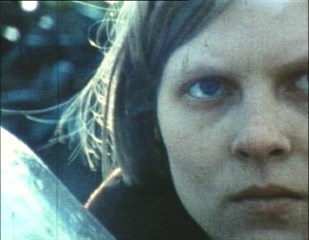Counter images. Alternative Images - Underground Films from the GDR, 1980-89

On 18 June at 4 pm.screening of the programme Gegenbilder / Counter images. Alternative Images - Underground Films from the GDR, 1980-89 from the East German Experimental Film Archive EX.ORIENTE.LUX at the National Gallery of Art. The programme has been put together and will be presented by Claus Löser, founder of the archive, curator, musician, filmmaker and critic. The programme will include films by Gino Hahnemann, Cornelia Schleime, Volker Lewandowsky, Claus Löser and Thomas Werner.
Overview
The latter years of the GDR saw, parallel to closely-related tendencies in literature and the fine arts, the emergence of an independent underground film scene fully removed from the official media and state-controlled amateur film circuit. The instigators in these various art forms were a new generation, one "born into" the hardened political realities of socialism-in-practice. In film they employed the most basic of equipment (usually Super 8) to produce a series of works varying enormously in quality, but all of which are bound by their unusual perspective on life in the GDR. In the late seventies it was primarily painters who seized on film as a way of enlarging their artistic possibilities. A pioneer here was A.R. Penck, followed among others by Lutz Dammbeck, Cornelia Schleime, Christine Schlegel, later in particular the "autoperforationsartisten" from the faculty of stage design.Whilst technically extremely limited (working without sound, with one-off reversal film and takes a maximum of thirty seconds in length), they developed a wealth of imaginative resources. They painted, scratched and divided the film material, combined documentary images with roughly-sketched fiction or filmed their own staged actions. In the early eighties also an increasing number of narrative-oriented film-makers tried their hand in the medium (Gino Hahnemann, Thomas Werner, Claus Löser etc) - to the consistent vexation of the authorities, who were determined to check this wilful self-expression outside their sphere of sanction and veto. There was no question of these films finding an audience - the state bureaucracy observed the course of events with great suspicion and the aid of a hugely expansive secret police operation; permits for public screenings of the films were unthinkable. In any case, with many of the artists emigrating to the West, the movement dissolved before it could really take shape.
The Program
1) Gino Hahnemann:September September (1986 - Super-8 - 6 min)
Lost, wet streets in the East-Berlin-District Prenzlauer Berg, only few people are passing, a performance in a church and screen shots of Jean-Luc Godard and Rosa von Praunheim. A parable of the closed area of East Gemany, also a reflexion of filmmaking itself. Gino Hahnemann was the most important, filming gay artist in GDR. He works as a poet and video maker in Berlin.
2) Cornelia Schleime:Unter weißen Tüchern (1983 - Super-8 - 9 min)
A lonely women is moving through closed rooms, she's waiting, we don't know what for. Surrealistic scenes as a reaction of the paralysed time. Conny Schleime is a important painter, she also left GDR in the 80's.
3) Cornelia Klauß:Samuel (1984 - Super-8 - 4 min)
A lost station of the city railway in East Berlin. A child tries to play, but the world of correctnes won't accept this. Conny Klauß studied dramaturgy in Potsdam-Babelsberg, left GDR in 1989 and works now as a director of the cinema "Babylon" in Berlin.
4) Volker Lewandowsky:Report (1987 - Super-8 - 7 min)
A dark collage of found footage and other mysterious pictures - a hommage to Heiner Müllers Shakespeare-adaption"Titus Andronicus - The Fall of Rome". Lewandowsky was member of the famous artist group "Autoperorationsartisten", he lives as a painter in Berlin.
5) Claus Löser: Nekrolog (1985 - 16mm - 7 min)
Paranoia as a allday feeling. Kafka-like scenes from Karl-Marx-Stadt (today Chemnitz).
6) Thomas Werner: Guten Tag, Berlin (1987 - Super-8 - 12 min)
As a hommage to Eugene Ionesco's first play "La cantatrice chauve" Werner mixed the sound of a language lerning record with pictutes of a official promotion film about East Berlin and self made sequences. The artist studied after 1990 experimental film by professor Heinz Emigholz in Berlin.
7) Ramona Koeppel-Welsh:Konrad! (1989 - Super-8 - 9 min)
Found footage and old home movies from the artists family mixed up with short narrative scenes - a poem about the life in closed circles. Ramona Koeppel-Welsh is the only filmmaker who still realizeses movies on Super-8. She also works as a performance artist and a painter.
DR. CLAUS LÖSER born 1962 in Karl-Marx-Stadt (today: Chemnitz). Since 1980, producer of texts, music and films. 1990-1995: study at film school Potsdam-Babelsberg (diploma). Since 1990 responsible for programme of the "BrotfabrikKino" in Berlin. Since 1992 independent film critic (e.g. for taz, Berliner Zeitung, film-dienst). 1996 founder of the collection "ex.oriente-lux - Experimentalfilmarchiv Ost 1976 bis 1989" and editor of the book "Gegenbilder - Filmische Subversion in der DDR". Since 2012 he publishes a weekly columne in the "Berliner Zeitung". Curator, musician, film maker and film critic; numerous publications, e.g. on underground and experimental film as well as producing film under totalitarian conditions; besides that he is active in committees, juries, professional associations and in teaching. Lives and works in Berlin.
The entrance is free of charge. The event will be held in English.
For more information call: +370 5 2122997
Image: Cornelia Schleime:Unter weißen Tüchern (1983)
4 pm
On 18 June at 4 pm. screening of the programme Gegenbilder / Counter images. Alternative Images - Underground Films from the GDR, 1980-89 from the East German Experimental Film Archive EX.ORIENTE.LUX at the National Gallery of Art. The programme has been put together and will be presented by Claus Löser, founder of the archive, curator, musician, filmmaker and critic. The programme will include films by Gino Hahnemann, Cornelia Schleime, Volker Lewandowsky, Claus Löser and Thomas Werner.
The event is part of the parallel programme to the exhibition "Restless Bodies. East German Photography 1980 - 89"


